ONE WORLD, ONE DREAM, FREE TIBET 2008BOYCOTT THE 2008 BEIJING OLYMPIC GAMES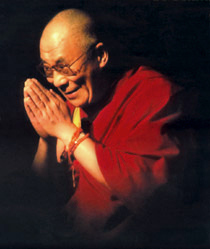 Tenzin Gyatso, the 14th Dalai Lama of TibetChina's Undercover War in TibetTuesday, November 9, 1993Forwarded by Mark A. Sheldon
LHASA, November 4, Christian Science Monitor -- An elusive patina of peace now envelops Lhasa. Although radical Tibetan protesters stoned government buildings and Chinese-run businesses earlier this year, security forces that now guard the Chinese settlements and plainclothes police who circulate among the Tibetan pilgrims enforce an unspoken cease-fire. Harmony Masks DissentBeneath the superficial tranquility of Lhasa, the opposing ideologicial forces of Tibetan Buddhism and Chinese Marxism are still engaged in a four-decade-long battle over the future of Tibet. Tibetan monks, students, and workers say that the influx of Chinese into the region, along with Beijing's expanding infiltration of monasteries, threatens to bury Tibetan culture. "Within this peace is a kind of war," says one young monk. On the streets outside the Jokhang Temple, Tibet's holiest shrine where demonstrators and police clashed earlier this year, harmony masks dissent. Brave New TibetClosely watched by security forces and surveillance cameras, dark-robed pilgrims prostrate and turn brass prayer wheels as they circle the temple. Tibetan children and elderly beggars receive a few coins or barley kernels from worshipers and share their alms with monks, or lamas who chant prayers for the liberation of man. Nearby, new bars, mahjong parlors, and karaoke halls line Beijing Avenue, the main street that bisects the capital. Once-impoverished peasants from China's nearby Sichuan Province profiteer by buying raw materials from Tibet at state prices or by selling "imported" Chinese goods on the free market. They share their riches with Chinese Communist Party officials who issue business permits and fund new military projects outside the city. The authorities, in turn, issue passes to select Tibetan pilgrims for entry into the Place of the Gods, as Lhasa is known. This growing Chinese influence and control are fueling Tibetan nationalism. "In the past, the party attacked Tibet's monasteries with guns and tanks," one monk says. "But today the government uses undercover police and management committees to attack us from within." "This is a much more sophisticated method of causing the slow death of Tibetan Buddhism," he said, " and may succeed where the weapons failed." Democratic Management CommitteesDemocratic Management Committees, made up of religious personnel and party officials, have replaced Buddhist abbots at the head of major monasteries and temples, according to lamas and Western human rights monitors. These committees control lamasery funds, sometimes pay for secret police to monitor monks, and include officials who oversaw the destruction of monasteries nearly 30 years ago, says John Ackerly, spokesman for the Washington, D.C.-based International Campaign for Tibet. Mao's Cultural RevolutionIn the 1960s, Chairman Mao Zedong presided over a countrywide purge of traditional beliefs that has come to be known as the Cultural Revolution. Radical young Red Guards pillaged thousands of Tibetan cloisters and temples, and tens of thousands of monks and nuns were killed or sent to concentration camps. In even the most remote valleys of this fervently religious region, Mao's portrait replaced Buddhist icons, including pictures of the Dalai Lama, Tibet's exiled god-king. Anyone caught praying or offering sacrifies [sic] to the gods was subject to torture and imprisonment. "The Cultural Revolution wiped out almost an entire generation of monks, scholars, artists and doctors," says a lama in Lhasa. Monasteries served as Tibet's sole universities, the lama says, and offered training not only in religion, but also in art, philosophy, medicine, and architecture. "So by attacking the church," the lama says, "the party struck at the heart of Tibetan culture." After Mao's death in 1976, Beijing announced that it would finance the reconstruction of some Tibetan temples as part of the party's liberalized management of religion. A Buddhist revival restored traces of Tibet's mythical history. Remains of Another DayHundreds of monks who remained of the half-million that once inhabited Tibet returned to the ruins of their temples. Pilgrims once again began trekking into the Lhasan valley, and brought with them long-hidden Buddhist relics or coins. Yet even today, the party strictly controls religious life, according to Tibetan monks and Western scholars. Lamaseries are no longer permitted to admit school-aged children, and public schools teach in only Chinese. "If Tibet doesn't regain its independence within the next generations, we may lose not only our religion, but also our language and entire way of life," a teacher in Lhasa laments. Strict limits are placed on the size of each monastery, and novices are required "to love the Communist Party," according to the official Chinese press. Museum Keepers"The party wants to restore the form of the temple, but destroy its inner life," a young monk says. "The government knows that the monasteries draw foreign tourists, but also believes that the clergy is at the heart of the independence movement. So they want to transform us into museum keepers, workers, or traders - anything but monks." Glowing ReportsThe Chinese media frequently issues glowing reports of Tibet's economic progress under the leadership of the party. Yet Tibetans' average annual income is now only 490 yuan ($86), or less than one-fifth that of urban Chinese workers, according to official statistics. "China brags that it has built roads, power lines, and new businesses throughout Tibet," says a Tibetan student. "But the roads are only used by the Chinese Army and traders to enter Tibet. Most Tibetans can no longer afford electricity, while the new shops are all owned by Chinese." Anger over the growing income gap is causing a wider spectrum of Tibetans, including students, peasants, and the jobless, to join monks in anti-Chinese protests, Tibetan intellectuals and Western scholars say. Tension RisingBeijing's migration and religious policies are also creating a level of inter-ethnic tension that threatens to explode in the near future, says a Western diplomat who monitors Tibet. "When these conflicts begin, the loss of life through clashes on the streets will take a dramatic rise." But for now, Lhasa, the traditonal [sic] flashpoint of Tibetan-Chinese conflict, appears calm. Tibetan pilgrims continue to trickle into Lhasa, along with waves of Sichuan peasants seeking their fortune in the Western Treasurehouse, as Tibet is called in Chinese. And each day, as Chinese troops stand sentinel over the gates of the city, an army of monks whispers prayers for the liberation of the land. Although China continues to open more monasteries in Tibet, they are now run by Communist Party-led committees. Beijing wants tourism, but not the ideological clash.  Copyright (C) 1998, Mike BridgeCompiled by the Canada Tibet Committeeedited @buddhavision |
 Dalai Lama Urges Students to Shape the WorldMay 15, 2001 - Seattle TimesPORTLAND - The Dalai Lama admits to occasional self-doubts about fulfilling his role as the spiritual leader of the Tibetan people. But as long as he's on this planet, he figures he might as well be helpful to other people, to reach out with compassion and good cheer to create a more peaceful world. "Each of us has the potential to contribute," he said in an afternoon talk yesterday to 7,600 Oregon and southwest Washington high-school students. "You have a great opportunity to make a new shape of the world." During a lengthy talk lasting more than an hour, he returned again and again to that theme as he urged students to break cycles of violence that can poison their lives and schools. He also warned against getting caught up in external appearances, noting that dyeing one's hair blue or fixing a big nose won't help the inner person. And - to the delight of the students - this holiest of Buddhist monks showed ample signs of his humanity. Sitting comfortably in a wooden chair atop a stage at Memorial Coliseum, he popped candy in his mouth to sate a sweet tooth. Then he grinned like a mischievous schoolboy as he struggled to chew the gooey concoction. "This taste is very good - but sticks to my teeth." The Dalai Lama's talk was billed by organizers as the "Educating Heart Summit," and was one of the major events in a three-day visit to Portland scheduled to end today. The Dalai Lama has lived in exile in India since a violent, 1959 crackdown in his homeland by China. But he spends much of his life on the road, giving speeches that stress nonviolent resolutions to conflict. He received the 1989 Nobel Prize for Peace. His message resonates in an era when schools must be on guard against violent acts by gun-toting students. Included in the audience were some 35 students from Thurston High School in Springfield, Ore., where Kip Kinkel went on a May 1998 rampage in which his parents and two students were killed and 24 other students were wounded. "I think it was a really good message," said Meghan Cummings, a Thurston student, of the Dalai Lama's talk. "We need to stop to realize when we get too obsessed with material things that we can hurt people." The Dalai Lama was introduced by Sharon Kitzhaber, Oregon's first lady, and the youth summit had the support of the state Superintendent of Public Instruction. But the event was questioned by some Washington politicians who thought it was inappropriate for public schools to send students to hear a religious leader. As a result, private donors were accepted to cover the cost of the buses the students took to Portland. As students filed into the coliseum, they were met by a handful of Christian protesters who held signs proclaiming "Jesus Gives Eternal Life." One man shouted denunciations of the Dalai Lama. During his talk, the Dalai Lama largely steered clear of religious themes. At one point, he said that practicing religious beliefs can help develop a warm-hearted, compassionate person who can help change the world. But he also said it was possible to develop those traits without religious beliefs. Students, in a question-and-answer period, asked some hard questions. One girl wanted to know how to react to a shooter who takes aim at a classmate. The Dalai Lama said acts of violence should be remembered, and then forgiveness should be extended to the perpetrators. But if someone has a gun and is trying to kill you, he said, it would be reasonable to shoot back with your own gun. Not at the head, where a fatal wound might result. But at some other body part, such as a leg. Another student asked whether the Dalai Lama, who was picked as the spiritual leader by monks at the age of 4, ever had any doubts about his exalted role. "I sometimes have feelings of not being able to fulfill the responsibilities," the Dalai Lama said. But when these feelings come over him, he said, he tries to think positive thoughts. As he finished his talk, students stood and cheered. He cupped his hand to his forehead in a farewell sign of respect, smiled and then disappeared behind a black curtain that hung across the stage.  Compliments of the Office of TibetTURN THE WORLD AROUND |
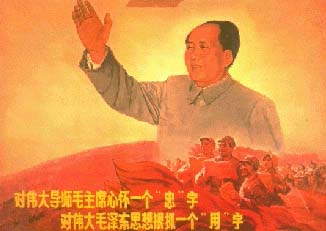 Folk Hero Or Uncompromising Ruthless Dictator?Giant Mao Statue Erected In TibetApril 17, 2006 - BBC NewsThe Chinese authorities say they are putting up a huge statue of Chairman Mao Zedong in Tibet. The 35-ton memorial is being built to commemorate the 30th anniversary of the former leader's death. It is being erected in Gonggar County, near the Tibetan capital Lhasa, China's state-run news agency Xinhua said. The statue will rise 7m from a 5m pedestal strengthened to withstand earthquakes. Mao Zedong ordered the Chinese takeover of Tibet in 1950. The statue will be the central landmark of Gonggar County's Shangcha square, which covers about 40,000 sq metres, and is scheduled for completion in July. According to the Beijing authorities, the statue of Mao Zedong will be the largest of its kind in China and the first in Tibet. Changsha, capital of Hunan province and Mao's hometown, has donated 6.5m yuan ($811,000; £461,000) towards the cost of the plaza and statue, Xinhua reported. "Many Tibetan people suggested we should have a statue of Chairman Mao to show our gratitude," a local Communist Party official told Xinhua. Mixed ReactionThe BBC's Daniel Griffiths in China says the statue is likely to get a mixed reaction from many Tibetans. From Beijing's perspective, the area has been part of China for centuries. But for many, the Chinese government is an occupying power which has shown scant regard for human rights or for Tibet's unique culture, our correspondent says. Communist troops marched into Tibet in 1950. Nine years later, the region's spiritual leader, the Dalai Lama, fled into exile along with tens of thousands of his followers after a failed uprising against Chinese rule. Since then, China has exerted tight control over the region and this new statue of Mao Zedong is another reminder of Beijing's influence there, our correspondent adds. @buddhavision commentJung Chang and Jon Halliday declare in the very first sentence of their recent biography of Mao Zedong, Mao: The Unknown Story, that he "was responsible for well over 70 million deaths in peacetime, more than any other 20th-century leader." To Chang and Halliday, Chairman Mao was a scheming opportunist who mercilessly butchered his way to the top, then squandered the lives and wealth of his own people in a bungled quest for lasting global influence. The two authors make an impressively strong case. Chang, a former Red Guard and "barefoot doctor" now married to Halliday, a British historian, is known for her 1991 memoir Wild Swans, one of the biggest-selling books of all time (10 million copies in 30 languages). Since its publication Chang has done little, except delve into the life of the man who devastated her family in Wild Swans. Her parents, dedicated Communists, were denounced as class traitors during Mao's infamous Cultural Revolution. Chang's father was tortured, driven insane and literally worked to death in a Chinese labor camp. Jung Chang's memoir Wild Swans tells the story of three Chinese daughters and their brave new struggle against Mao's barbaric Communist regime. The story begins in the early 1900s and ends in 1978. Through it all, love and loyalty conquers all, even the political dogma of a ruthless dictator trying to pass himself off as a hero to the common people. Something tells me Mao's giant statue is headed for a fall, for there shall come another social revolution to do away with the Chinese Communist Party once and for all. Yes, the writing is on the Great Wall, and the haunting shadow of the Chairman shall grow very very small, and everlasting freedom for Tibet and its courageous Buddhists shall be the clarion call ...  All Crimes Will Be Paid |
 The Dalai Lama will be 71 in JulyFathoming Tibet's Political FutureApril 25, 2006 - BBC News - edited @bvMany Tibetans believe that only the Dalai Lama can save Tibet from extinction. But even a Dalai Lama is mortal. And they are deeply anxious about what will happen when the present one dies. For Tibetans, he is not just a Buddhist monk, a god and a king - the latest in a centuries'-long line of spiritual and temporal rulers - but a larger-than-life symbol of their unique civilisation. For the past 50 years, from his sanctuary on the other side of the Himalayas, the 14th Dalai Lama has kept alive their dreams of survival as a separate people. Many fear that his death will rob them of their last chance of any genuine self-rule. Others predict chaos and bloodshed. Tibetan extremists might finally feel free to resort to terrorism, giving Beijing the chance to crack down harder. The Dalai Lama fled to India in 1959, amidst a failed uprising against the Chinese occupation which had begun nine years earlier. Since then he has been the face of Tibet for the outside world. He has won the Nobel Peace Prize, the public backing of film stars, and the private support of presidents and prime ministers. But no country recognises his government-in-exile. And as China's power grows there are few who even dare question its claims over Tibet. The Dalai Lama has become more important than ever to Tibetans since he left his homeland, according to Phuntsog Wangyal, who also fled in 1959 after taking up arms against the Chinese. "He not only touches the people's hearts but he is ingrained in their minds. They have total faith in him," he said. "It is impossible for the Chinese to destroy this image in his lifetime. But it is inevitable that he will die." As a founding trustee of the London-based Tibet Foundation, Phuntsog Wangyal believes the sheer charisma of the present Dalai Lama will be hard to replace. "Who will take up his mantle? There is no-one equivalent to him. I don't think anyone will be able to have that kind of authority." The extent of that authority was graphically displayed recently when thousands of people in Tibet threw their rare animal skins onto huge fires after the Dalai Lama criticised the use of products from endangered species. Communist ControlChina says it wants the next Dalai Lama to be chosen under its own supervision. It is highly unlikely to accept someone from beyond its borders. In 1995, the Dalai Lama recognised a six-year-old boy in Tibet as successor to the 10th Panchen Lama, who died in 1989. China detained the boy and chose another in his place. The original boy has not been seen since. "The Chinese definitely want to see the Dalai Lama die so they can have a Dalai Lama of their own", said Mr Godrokba. But he believes the non-violent, moderate path espoused by the present Dalai Lama could be abandoned by Tibetans after his death. "Violence is something in the hearts and minds of Tibetans. But so long as we have the Dalai Lama it is not easy to organise anything. It will take time," he said. "The Tibetan Youth Congress's commitment to independence will never change," he added. Return of the KingThere is growing speculation that the Dalai Lama's dream of visiting Tibet - or at least some Tibetan parts of China - might indeed become reality before he dies. Earlier this month, China renewed its offer to discuss such a visit if he made it clear he had "completely abandoned Tibetan independence". The prospect of having more control over his successor just might tempt Chinese communists to relax their stringent political conditions. But Beijing is also aware of the danger - that the high emotions aroused by the return of Tibet's god-king after half a century could lead to the biggest demonstrations yet against Chinese rule.  The Light of Tibet |
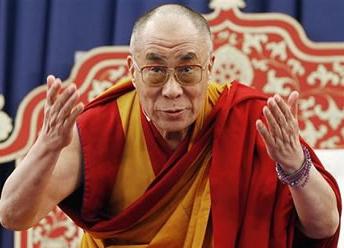 Chinese Communists Tighten Control |
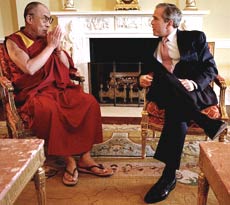 Photo compliments of The New York TimesDalai Lama To Receive American Stamp of ApprovalTuesday, October 16, 2007Political Satire - The Daily LamaThe Chinese communist horde has warned crusading American President George W Bush not to go ahead with a planned meeting with the Dalai Lama tomorrow, claiming it would "seriously damage" relations between the two already highly ideologically-opposed atomic nations. King GW is due to attend the upcoming ceremony at the US Capitol, where the Dalai Lama will receive a Congressional Gold Medal, a top US civilian award signifying America's political and religious stamp of approval, or absolutely nothing - whatever the subterfuge may be. One thing is for certain however: It will be the first time a lame duck American president of questionable royal lineage will have appeared in public with the exiled 72-year-old spiritual leader of the Tibetan people. White House propagandists claim Mr Bush quite understands Beijing's paranoid posturing, but sincerely hopes the commies truly get to know the Dalai Lama as a man of peace, love and understanding, just the sort of chap the American President is presently painting himself out to be for the world's gullible liberal press. Communist officials in Tibet expressed a woman's fury at the blatant announcement of the upcoming civic award, and fervently condemned the kind old spiritual leader for trying to split the mother of all motherlands in two, or three, or perchance four, as in Gang of Four. Although the Dalai Lama has lived in exile in India since a failed uprising against commie rule in 1959, Beijing fears the 1989 Nobel Peace Prize laureate is actively seeking to destroy China's so-callled "sovereignty" by pushing for independence for Tibet and its dwindling Buddhist population. Communist China claims Tibet has been its territory for centuries, but many highly civilized nations around the world beg to differ, just as long as no one tells them to give the land they stole from other ethnically-cleansed populations back. Recently, world leaders have grown more vocal in their inflated concern for human rights in communist-occupied Tibet. In September, German Chancellor Angela Merkel met with the Dalai Lama, incurring much commie wrath. The historic Berlin meeting prompted Red China to withdraw from a Germany-China symposium scheduled to be held in Munich or March. The Dalai Lama has also met Austrian Chancellor Alfred Gusenbauer and Australian Prime Minister John Howard this year, and is due to meet pudgy Christian neo-con Canadian Prime Minister Stephen Harper later this month. It is rumoured that Harper is Bush's new lap dog now that Tony Blair has been put out to pasture with a certain Margaret Thatcher. The People's Republic of China was definitely outraged when the Canucks granted the Dalai Lama honorary citizenship last year, which only goes to prove that those godless commies are seriously behind the times and have no sense of what is politically fashionable, not to mention correct. That's why it is imperative to boycott the 2008 Olympic Games in Beijing - not to mention cheapass Chinese knockoff products flooding global markets only to end up in dollar stores where they will be feverishly purchased by penny-pinching old ladies - until the aforementioned commies seriously get the lead out of their uptight yellow arses and set the Tibetan people free, and then mass-convert to Christianity, which may positively affect our fanatical Muslim brothers into doing the same. God Bless America, and everyone on America's side. Amen. Have a good read, and then go forth and sew your seeds of popular discontent. Who knows, there may be a shiny new medal in it for you from you benevolent old Uncle Sam. Cheers. |
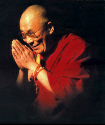 FREE TIBET UPDATEMonday, March 10, 2008Tibetan Exiles On The March While Dalai Lama Lays It On The LineMore than 100 Tibetan exiles have begun a march from India to Tibet to protest against Chinese rule in the region. The marchers left Dharamsala on the 49th anniversary of the Dalai Lama's escape from Tibet after a failed uprising against Chinese communist rule. The Dalai Lama, Tibet's spiritual leader, has called for greater pressure on China over its human rights record. In Nepal, over a 1,000 Tibetan exiles have clashed with police in Kathmandu while trying to march to the Chinese embassy. Tibet activists are hoping to use China's hosting of the Olympics to publicise their cause. Before the marchers in India set off, the Dalai Lama said he approved of China hosting the games because it provided the world with a chance to pressurise the Beijing government to uphold the Olympic ideals of freedom of speech and equality. "China should prove herself a good host by providing these freedoms. Therefore, besides sending their athletes, the international community should remind the Chinese government of these issues," the Dalai Lama said. The Dalai Lama heads the Tibetan government in exile in Dharamsala, a northern Indian hill town. In hard-hitting remarks, the Dalai Lama said that "repression continues to increase with numerous, unimaginable and gross violations of human rights, denial of religious freedom and the politicisation of religious issues" by China. Tibetan exile groups say the march is to be one of several protest events in the run-up to the games in Beijing in August. "It could potentially be our biggest protest since we came into exile in 1959. We are determined to go home and nobody could stop us from doing that," Lobsang Yeshi, one of the co-ordinators said. Organisers say they represent tens of thousands of Tibetan exiles, and want to draw attention to what they see as Chinese suppression of Tibetan identity. Meanwhile police in the Nepalese capital, Kathmandu, say that up to 80 protesters have been arrested. Eyewitnesses told the BBC between 1,000 to 3,000 Tibetan exiles and their supporters gathered at a large Tibetan Buddhist shrine, including many monks and nuns. Protests by Tibetans have also been held in other parts of the world, including the Greek capital, Athens, where protesters were prevented from getting into the site of Olympia, the birthplace of the ancient Olympic Games. Original Source: BBC Newsedited @buddhavision |
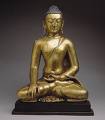 FREE TIBET UPDATEThursday, March 13 - Saturday, March 15, 2008Commies Crack Down On Dissent In LhasaChinese communists have admitted that Buddhist monks were protesting in the Tibetan city of Lhasa earlier this week. Foreign ministry spokesman Qin Gang said the authorities had stabilised the situation. Unconfirmed reports said as many as 600 monks had taken part in rallies, and that police used tear gas to disperse them. Rights groups said the demonstrations were the biggest display of opposition to Chinese rule in Tibet since 1989. US-based Radio Free Asia reported on Tuesday that dozens of monks had been detained as the authorities sought to crack down on political dissent. Beijing claims sovereignty over Tibet, which it has occupied since invading in 1950; however, many Tibetans remain loyal to their spiritual leader the Dalai Lama, who fled in 1959. They believe their culture has been diluted or even destroyed by the ongoing plantation of Han Chinese, communist China's biggest ethnic group. The Tibetan government-in-exile, based in northern India, said it had information that as many as 100 Tibetans may have been killed by Chinese communist forces. Meanwhile, Tibet's hardline commie boss, Zhang Qingli, is not amused by the recent protests, and he has mobilized "officially favoured" Buddhist monks to denounce the popular uprising and its clandestine spiritual leader, the Dalai Lama.
Original Source: BBC Newsedited @buddhavisionCHINA: THE WORLD'S BIGGEST PRISON FOR JOURNALISTS AND CYBER-DISSIDENTS |
 FREE TIBET UPDATESunday, March 16, 2008Dalai Lama Calls For An International InvestigationThe Dalai Lama is calling for an international investigation into the recent brutal crackdown against Buddhist protesters in Tibet. Speaking from Dharmsala, India, he told world reporters that a respected international organization should find out what the present situation is in Tibet. Whether intentionally or unintentionally, the Dalai Lama believes cultural genocide is taking place. "There is some kind of discrimination and Tibetans in their own land quite often are treated as second-class citizens," he admonished. Concern over the loss of Tibetan identity and culture has played a role in recent tensions between indigenous Tibetans and outside Han Chinese. Chinese immigrants have been flocking to Lhasa in recent years, and at the height of Friday's unrest, demonstrators set fire to Chinese-owed shops and hurled rocks at local police. Hundreds of armed police and soldiers were patrolling the streets of Lhasa on Sunday. Hong Kong Cable TV reported some 200 military vehicles on Sunday drove into the city centre, which was mostly empty. There were also unconfirmed reports of further Tibetan independence protests with arrests and casualties in China's southwestern Sichuan province. A police officer said about 200 protesters burned down a police station. Original Source: CBC Newsedited @buddhavision |
 FREE TIBET UPDATEThursday, March 20, 2008Chinese Goons Continue Brutal CrackdownChinese communists say they have arrested 24 Tibetans over Lhasa protests. Supposedly, 170 protesters have surrendered to their Chinese occupiers. As usual, strict limits have been placed on Western journalists trying to cover the ongoing unrest in Tibet, as Communist China continues to mask its brutal occupation from the rest of the civilized world. Senior communist officials have repeatedly accused the Dalai Lama of orchestrating the protests from afar. The foreign ministry once again labelled him a "splittist" on Thursday. Chinese and Tibetan sources have given very different accounts of the protests that began in Lhasa on March 10th. Tibetan exiles say that at least 99 people have died so far, including 80 in Lhasa. They also accuse communist security forces of firing indiscriminately on protesting crowds. At this time it is not clear whether the 24 recently arrested were among the 170 said to have already surrendered to their communist oppressors. International rights groups say they have heard reports that hundreds have been arrested, which is probably closer to the truth. Both sides agree that the recent violence in Tibet must come to an end; however, outsiders have been encouraged to boycott the summer games in Beijing as a strong show of moral support for the Tibetan people in their ongoing fight for freedom and independence. Original Source: BBC Newsedited @buddhavision |
 FREE TIBET UPDATEThursday, March 27, 2008Tibetan Claims of Staged Violence Confirmed By British Spy AgencyBritan's government communications agency, which electronically monitors half the world from space, has confirmed the claim by the Dalai Lama that agents of the Chinese People's Liberation Army posing as rampaging monks, triggered the recent riots that left hundreds of Tibetans dead or injured. The British intelligence agency believes the decision was deliberately calculated by the Beijing leadership to provide an excuse to stamp out the growing unrest in the region. Images downloaded from spy satellites provided confirmation the communists used agent provocateurs to start riots, which gave the PLA the excuse needed to move on Lhasa. Knowing that the Dalai Lama's supporters in Tibet and elsewhere in China would become more politically active in the months leading up to the summer games, British intelligence in Beijing ascertained the communist regime was seeking a valid excuse to crush the growing political dissent. What the regime had not expected however, was how the riots would spread, not only across Tibet, but also to Sichuan, Quighai and Gansu provinces, turning a large area of western China into a battle zone. Many of the Dalai Lama's followers are young, unemployed and dispossessed, and fervently reject his philosophy of non-violence, believing the only hope for change is the radical actions they are now engaged in. Original Source: The Epoch Timesedited @buddhavision |
 The Dalai Lama, Tenzin Gyatso, is the true spiritual and temporal Leader of the Tibetan people. He was born on July 6, 1935, in a small village called Taktser, in north eastern Tibet. Born to a peasant family, His Holiness was recognised at the age of two, in accordance with Tibetan tradition, as the reincarnation of his predecessor the 13th Dalai Lama. The Dalai Lamas are manifestations of the Buddha of Compassion who choose to take rebirth for the purpose of serving other human beings. Dalai Lama means Ocean of Wisdom. Tibetans normally refer to His Holiness as Yeshe Norbu, the Wish-fulfilling Gem or simply Kundun, meaning The Presence.  BE GENTLE TO THE EARTH |